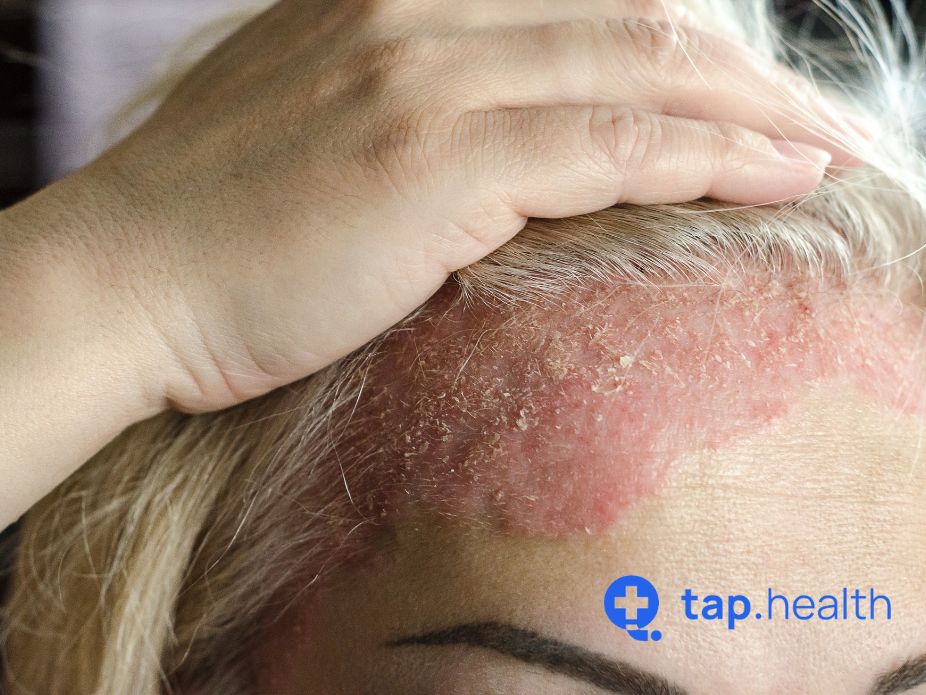Scalp psoriasis can be frustrating and challenging, but understanding its causes, symptoms, and treatments can make a significant difference. This blog post will explore various treatment options, from mild to severe cases, and offer tips for prevention and natural remedies. Let’s dive into scalp psoriasis treatment and learn how to manage it effectively.
What is Scalp Psoriasis?
Scalp psoriasis is a common skin disorder that leads to the rapid build-up of skin cells on the scalp. This build-up forms thick, red patches often covered with silvery-white scales. These patches can be itchy, painful, and may cause hair loss in severe cases. Psoriasis is an autoimmune condition, meaning the body’s immune system mistakenly attacks healthy skin cells.
Causes of Scalp Psoriasis
The exact cause of scalp psoriasis is not fully understood, but it’s believed to be related to a combination of genetic, immune, and environmental factors. Here are some common triggers:
- Genetics: A family history of psoriasis can increase the risk.
- Immune System: Overactive T-cells (a type of white blood cell) attack healthy skin cells, causing rapid cell production.
- Stress: High stress levels can trigger or worsen psoriasis.
- Infections: Certain infections, like strep throat, can trigger an outbreak.
- Medications: Some drugs, including lithium and beta-blockers, can trigger psoriasis.
- Weather: Cold and dry weather can exacerbate the condition.
Treatments for Mild Scalp Psoriasis
For those with mild scalp psoriasis, over-the-counter treatments can be quite effective. These treatments typically include:
1. Medicated Shampoos
Shampoos containing coal tar or salicylic acid can help reduce scaling and inflammation.
2. Topical Steroids
Low-strength steroid lotions and creams can reduce inflammation and itching.
3. Moisturizers
Regularly applying moisturizers can help keep the scalp hydrated and reduce flaking.
Medical Treatments for Scalp Psoriasis
When over-the-counter treatments aren’t enough, medical treatments prescribed by a doctor may be necessary. These treatments include:
1. Topical Treatments
Stronger steroid creams, lotions, and foams can be applied directly to the scalp to reduce inflammation and slow down skin cell production.
2. Vitamin D Analogues
Calcipotriene and calcitriol are synthetic forms of vitamin D that can slow skin cell growth.
3. Anthralin:
This treatment slows down skin cell growth and can help remove scales.
Systemic and UV Treatments for Scalp Psoriasis
For moderate to severe cases of scalp psoriasis, systemic treatments (medications that work throughout the body) or light therapy may be recommended:
1. Systemic Medications
Oral or injected medications, like methotrexate, cyclosporine, and biologics (e.g., adalimumab, infliximab), can reduce inflammation by targeting specific parts of the immune system.
2. Phototherapy
UVB light therapy involves exposing the skin to ultraviolet light under medical supervision. This can slow skin cell turnover and reduce scaling and inflammation.
How to Prevent Scalp Psoriasis?
While it may not be possible to prevent scalp psoriasis entirely, certain lifestyle changes can help reduce the frequency and severity of flare-ups:
- Manage Stress: Stress management techniques, such as yoga, meditation, and deep-breathing exercises, can help reduce flare-ups.
- Avoid Triggers: Identify and avoid personal triggers, such as certain foods, medications, or environmental factors.
- Maintain a Healthy Lifestyle: A balanced diet, regular exercise, and adequate sleep can strengthen the immune system.
- Protect Your Scalp: Use gentle hair care products and avoid harsh chemicals and excessive heat from hair dryers.
How to Diagnose Scalp Psoriasis?
Diagnosing scalp psoriasis typically involves a physical examination by a dermatologist. The doctor will look at the affected skin and may take a small skin biopsy to rule out other conditions, such as seborrheic dermatitis or fungal infections.
Natural Scalp Psoriasis Treatment
For those seeking natural remedies, several options may help alleviate symptoms:
- Aloe Vera: Known for its soothing properties, aloe vera gel can reduce redness and scaling.
- Apple Cider Vinegar: Diluted apple cider vinegar can help relieve itching. Avoid using it on cracked or bleeding skin.
- Coconut Oil: Applying coconut oil to the scalp can help moisturize and loosen psoriasis scales.
- Tea Tree Oil: This essential oil has anti-inflammatory properties that may help reduce symptoms. Dilute it with a carrier oil before applying to the scalp.
FAQ on Scalp Psoriasis Treatment
1: Can scalp psoriasis be cured permanently?
A: There is currently no cure for scalp psoriasis, but it can be managed effectively with the right treatments and lifestyle changes.
2: Is scalp psoriasis contagious?
A: No, scalp psoriasis is not contagious. It is an autoimmune condition and cannot be passed from person to person.
3: Can diet affect scalp psoriasis?
A: While there is no specific diet for psoriasis, a healthy diet rich in anti-inflammatory foods like fruits, vegetables, and omega-3 fatty acids may help reduce symptoms.
4: How often should I use medicated shampoo?
A: This depends on the severity of your condition and the specific product. Always follow the instructions provided by your doctor or on the product label.
5: Can scalp psoriasis lead to hair loss?
A: Yes, severe scalp psoriasis can cause temporary hair loss due to scratching and inflammation. Proper treatment can help minimize this risk.
Managing scalp psoriasis requires patience and a combination of treatments. Always consult with a healthcare professional to determine the best course of action for your specific condition.



